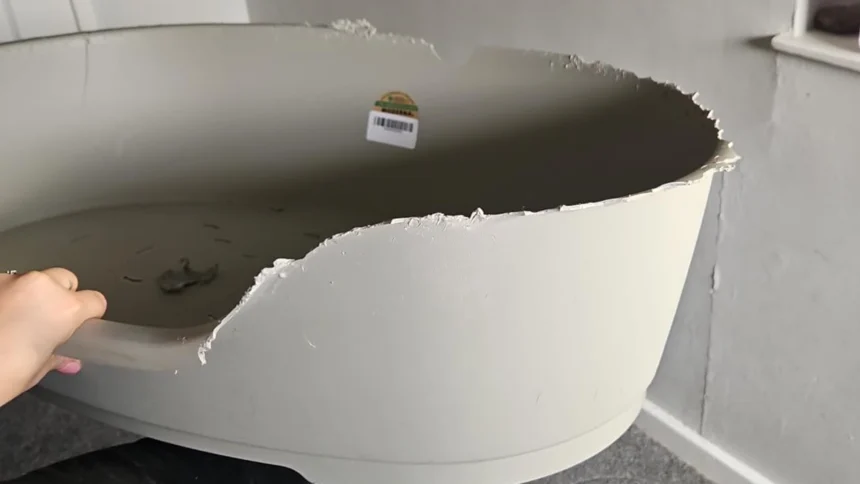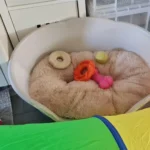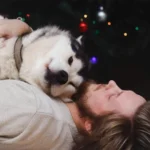It is our duty as dog owners to ensure our furry friends’ pleasure and wellbeing. Dogs can display a range of habits that may leave their owners confused or concerned because they are extremely smart and expressive animals. Three of these behaviors—eating, scratching, and licking plastic bedding—stand out as being particularly prevalent and having an impact on the security and welfare of dogs.
Eating
Dogs may chew on or ingest pieces of their plastic bedding for a variety of reasons, such as fatigue, hunger, teething, or even malnourishment. Watching out for this behavior is crucial since eating plastic can result in serious medical complications like injury or gastrointestinal issues that need immediate veterinary attention.
Scratching
Dogs scratch frequently, which is commonly linked to their innate desire to mark their territory or create a cozy retreat. Dogs scratching at their plastic beds may be a symptom of discomfort, a hint that there are parasites nearby, or just a way for them to release pent-up energy. Owners who understand this behavior may be able to offer more options for fit sheet material or correct basic medical issues.
Licking
There are a few explanations for why dogs might lick their plastic beds, such as tactile satisfaction, an attempt to tidy their present environment, or recurrent behaviors motivated by fear. Unnecessary licking may result in illnesses or skin irritation if untreated. If you want to maintain the dog’s current situation as well as it can be, you must understand why the dog is acting in this way.
By concentrating on these common behaviors, dog owners may increase the likelihood that they will understand their pets’ needs and make sure their environment is safe, cozy, and social. It is possible to improve the level of personal satisfaction that dogs and their owners experience by promptly and appropriately attending to these behavioral issues, which will promote a positive and healthy relationship.
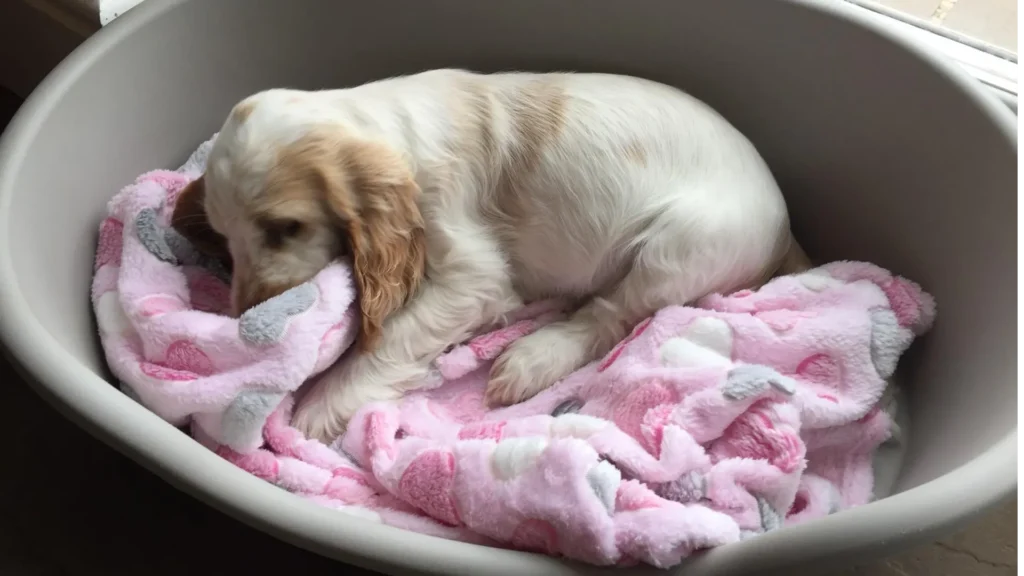
Why Is My Dog Eating Its Plastic Bed?
For a variety of reasons, including normal puppy behavior or indications of underlying problems, dogs may bite or consume their plastic bed.
Curiosity and Exploration
Dogs are naturally inquisitive animals, especially as puppies. The world is full of interesting and charming things to discover, and with their crimped surfaces and maybe noisy pieces, plastic sleeping cushions might be particularly intriguing to study with the naked eye.
Teething in Puppies
Like young humans, puppies who are teething feel uneasy and tingly in their gums during this time. Biting makes this discomfort feel much better, and a plastic bed could look like the perfect (and surprisingly open) bite toy.
Anxiety and Stress Relief
Dogs may bite in an attempt to protect themselves. To relieve pressure or anxiety brought on by obvious commotions, regular disruptions, or fear of abandonment, your dog may start biting on their bed.
Nutritional Deficiencies
Food deficits may occasionally be displayed by biting into unappetizing materials, such as plastic. If your dog isn’t getting enough nutrients and minerals from their meal, they may try to find them elsewhere, even if it means biting on their bed.
Pica in Dogs
Dogs that have excessive problem pica may bite or eat things that aren’t food. The same holds true for earth, wood, material, and plastic. If you think your dog could have pica, it’s imperative to visit your veterinarian to rule out any basic clinical concerns.
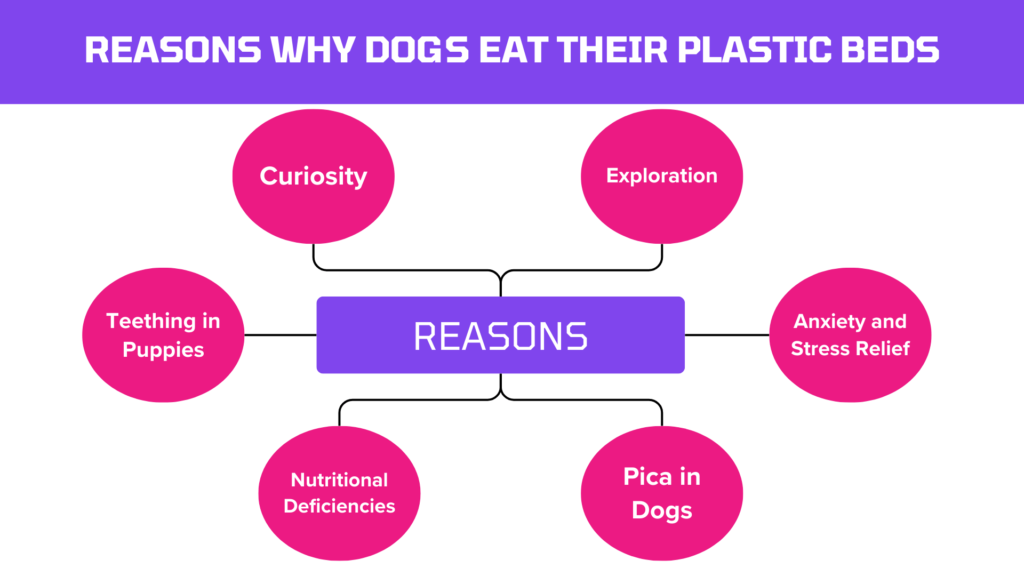
Why Does My Dog Scratch His Plastic Bed?
Instinctual Nesting Behavior
Dogs may bite in an attempt to protect themselves. To relieve pressure or anxiety brought on by obvious commotions, regular disruptions, or fear of abandonment, your dog may start biting on their plastic dog bed.
Marking Territory
Food deficits may occasionally be displayed by biting into unappetizing materials, such as plastic. If your dog isn’t getting enough nutrients and minerals from their meal, they may try to find them elsewhere, even if it means biting on their dog bed.
Comfort-Seeking Behavior
Dogs that have excessive problem pica may bite or eat things that aren’t food. The same holds true for earth, wood, material, and plastic. If you think your dog could have pica, it’s imperative to visit your veterinarian to rule out any basic clinical concerns.
Excess Energy or Boredom
An overtired dog may find enjoyment in digging, much like an overexcited newborn.
Temperature Regulation
Dogs can get relief from the intensity by digging to create a cool place in the ground, as was recently shown. On the other hand, in really cold climates, some dogs may dig to find a warmer tunnel.
Why Does My Dog Lick Her Plastic Bed?
Comfort and Self-Soothing
For canines, licking can be an unwinding and self-mitigating activity. Like how somebody can find solace in cuddling a toy or sucking their thumb, the tedious movement can deliver endorphins. This is especially obvious in the event that the fragrance of the bed is that of you or another pet, providing you with a sense of safety.
Scent Marking
Because of their sharp feeling of smell, canines mark their region and convey by utilizing fragrance stamping. Her fragrance is left on the bed when she licks it, giving it a more private touch.
Residual Food Particles
Your canine might be endeavoring to lick away any excess delicious follows assuming she has at any point eaten treats or spilt food on her bed.
Anxiety and Compulsive Behaviors
Severe licking may, incidentally, indicate fatigue or unease. In the unlikely event that your dog exhibits additional excessive behaviors or becomes restless, she may resort to bed licking as a coping mechanism for extra tough moments.
Health Issues or Nutritional Deficiencies
Paranoia, sensitivity, or queasiness are examples of underlying clinical issues that may be indicated by excessive licking. Dietary deficits can occasionally lead to impulsive behaviors, such as licking.
What To Do If Your Dog Eats, Scratches, or Licks a Plastic Bed
Remove Any Plastic Pieces
This is the first thing that worries me. Examine your dog’s mouth and the area surrounding it for any plastic fragments that he may have gnawed off. Furthermore, genuinely examine the sheet material to see whether there are any bits.
Check for Signs of Distress
Be advised that your dog may have consumed plastic if they exhibit signs like loose feces, vomiting, lethargy, or an undesirable wish.
Consult Your Veterinarian
Make a visit to your veterinarian as soon as possible if your dog seems sick or if you suspect it may have eaten plastic. They are capable of offering you guidance on the best course of action.
Monitor Your Dog’s Behavior
Regardless of whether your dog seems irritated at first, pay attention to them for the next twenty-four hours. Keep an eye out for any changes in their behavior or inner habits.
Health Risks Associated with Eating Plastic
Gastrointestinal Blockages
Plastic can obstruct the gastrointestinal tract in dogs. Plastic that a dog swallows may become stuck in its stomach or other digestive tracts, making it impossible for it to pass through the stomach’s supporting structure. There could be a lot of negative repercussions from this, such
- diarrhea and vomiting
- drowsiness and appetite loss
- stomach ache
Choking Hazards
Dogs may consume little amounts of plastic and choke on them. A dog’s airway may become blocked by a piece of plastic it inhales, making breathing difficult for the dogs .
Toxicity Concerns
Certain types of plastic may also contain dangerous materials that can be fatal to dogs if they ingest them. These toxins may find their way into the dog’s body and cause a variety of illnesses,
- such as organ damage.
- Cancer
- Endocrine disruption
Signs of Gastrointestinal Distress
Vomiting and Diarrhea
- These are the most typical signs of intestinal trouble in dogs.
- A person may vomit for a variety of reasons, including eating the wrong food, ingesting something they shouldn’t, or getting a more serious infection.
- Furthermore, bacterial infections, gastrointestinal parasites, and reckless eating are a few other conditions that might result in loose stools.
Loss of Appetite
- There can be intestinal issues if your dog isn’t showing signs of hunger.
- There are several other possible causes of canine malnutrition, so if your dog isn’t eating—which is unlikely—you should consult a veterinarian.
Lethargy and Weakness
- Dehydration, which can be triggered by heaving and loose feces, may be indicated by dormancy and weakness.
- Their symptoms may indicate a more serious ailment.

Abdominal Pain
- Pancreatitis, gastritis, and digestive blockage are just a few of the gastrointestinal disorders that can cause stomach pain.
- It’s possible for your dog to turn around or scream out when you touch them in the midsection since they may believe they are in pain.
How to Prevent Your Dog from Eating Plastic Beds
Provide Approved Chew Toys
- Provide a range of biting plays with different sizes, shapes, and surfaces. This locks in your dog’s natural tendencies and gives them more attention.
- Rotate toys regularly to accommodate oddities and energy.
- Select robust biting toys designed for robust chewers to prevent them from shattering into easily ingested bits.
Address Nutritional Needs
- By the way, biting could indicate nutritional deficits. Make sure your dog is getting all the nutrients they need from the food they are eating by speaking with their veterinarian.
- Eating a balanced diet lessens the impulse to eat unfavorable things.
Behavioral Training
- When your dog is biting on the plastic bed, firmly say “no” and give them a treat for using the proper bite toy.
- A bite-sized item that is rewarded for appropriate behavior can strengthen positive associations.
Environmental Enrichment
- Sustained biting may result from extreme exhaustion. Practice the following to help your dog’s brain:
- Puzzle feeders that are smart toys that release sweets
- Regular walks and games
- mentally taxing teaching programs
Managing Scratching Behavior
Use Durable Bed Materials
Dogs enjoy creating holes and constructing beds. Selecting a sturdy mattress protector will guarantee their comfort and keep them from destroying their sleeping area.
Provide Alternative Scratching Outlets
It’s normal for dogs to scratch, so teach them to use the appropriate channels when they feel the need to. Purchase matting or scratching shafts made of visually appealing materials such as sisal or cardboard. Place them in locations that your dog often goes to.
Regular Exercise and Mental Stimulation
Physical and emotional excitement keeps fatigue-induced scratching at bay. With regular walks, recess, and smart toys, your dog will get fatigued and less sensitive to hurt feelings.
Reducing Licking Behavior
Maintain Clean Bedding
Like human beings, dogs like having a fresh, tidy place to relax. Regularly wash your dog’s bed to get rid of allergens, odors, and hair that could irritate your dog and make him lick.
Address Anxiety and Stress
Dogs will occasionally lick to release stress or discomfort. Determine any possible sources of stress for your dog and make a concerted effort to reduce them.
Provide Engaging Toys
Another reason for unusual licking could be exhaustion. Provide your dog with a variety of drawing toys to keep them busy.
When to Be Concerned About Your Dog’s Behavior
Persistent or Worsening Symptoms
Here is where diligent behavior or behavior that ultimately proves to be more regrettable can be addressed. As particular examples, think about:
- excessive yelling or complaining, biting or digging House Training relapse
- Regulate your response.
- Unease surrounding the division
Behavioral Changes
This section can address any unusual or startling behaviors that deviate from your dog’s everyday demeanor. As particular examples, think about:
- fatigue or a drop in energy from previous recreational activities
- removing oneself or withdrawing from social situations
- an increase in hostility
- Variations in the desire for food
- pacing or acting agitated
Signs of Pain or Discomfort
This section might include concrete indicators that show the underlying suffering causing behavioral changes. As particular examples, think about:
- licking or biting a certain area of the body
- Whimpering or expressing discomfort verbally unable to stand or sit still, solidity or a limp, or alterations in gait or posture
Conclusion
Beyond comfort and size, there are other considerations when selecting the perfect dog bed. Being aware of your dog’s behavior when using a plastic bed could help prevent disruption and potential mischief.
- Despite being sturdy and easily cleaned, not all dogs will find plastic beds to be the most comfortable.
- Some dogs think plastic is harmful or cold to the touch.
- This frustration may cause you to bite, scratch, or get out of bed entirely.
FAQ
Why does my dog keep eating plastic?
There are several reasons why dogs consume plastic. It may manifest behaviourally as anxiousness or boredom, or it may be a medical illness known as pica.
How do I stop my dog from eating his bed?
You can prevent your dog from using your bed as a snack by making sure they get enough exercise and taking care of any underlying issues.
Is it bad for a dog to chew plastic?
Yes, dogs shouldn’t chew plastic in general.
How do I stop my dog from destroying her bed?
To help them release energy, make sure they play and exercise a lot. Provide suitable chew toys with a variety of textures to satisfy their want to gnaw as they can also be going through teething.
How to stop a dog from chewing on plastic?
- Take out all of the homemade chew toys.
- Eliminate Every Chewable Object.
- Use an anti-chewing spray on fixed items and furniture.
Is it normal for dogs to chew their bed?
Yes, dogs chewing on their bedding is a common occurrence. although occasionally they may be aimed at unsuitable objects like their own beds, couches, or shoes.

